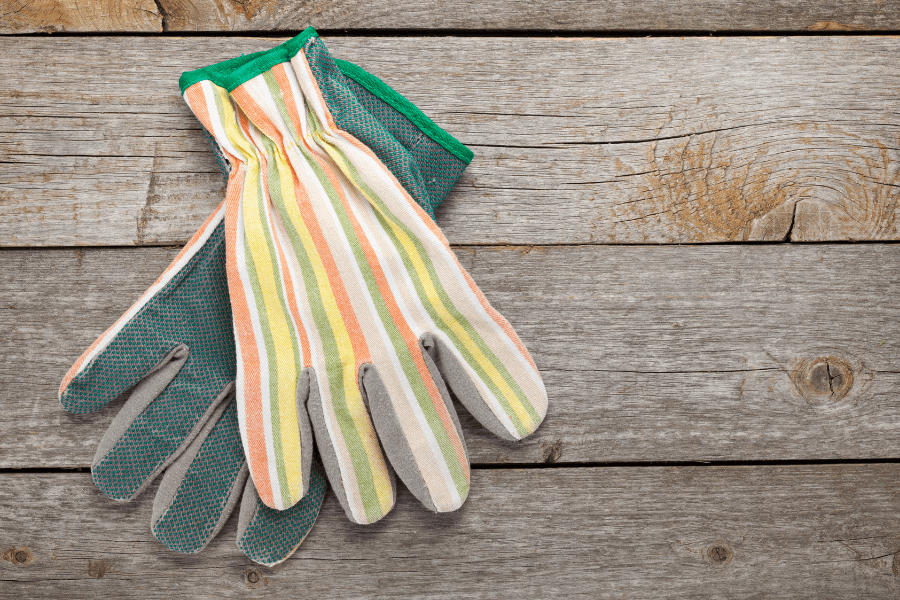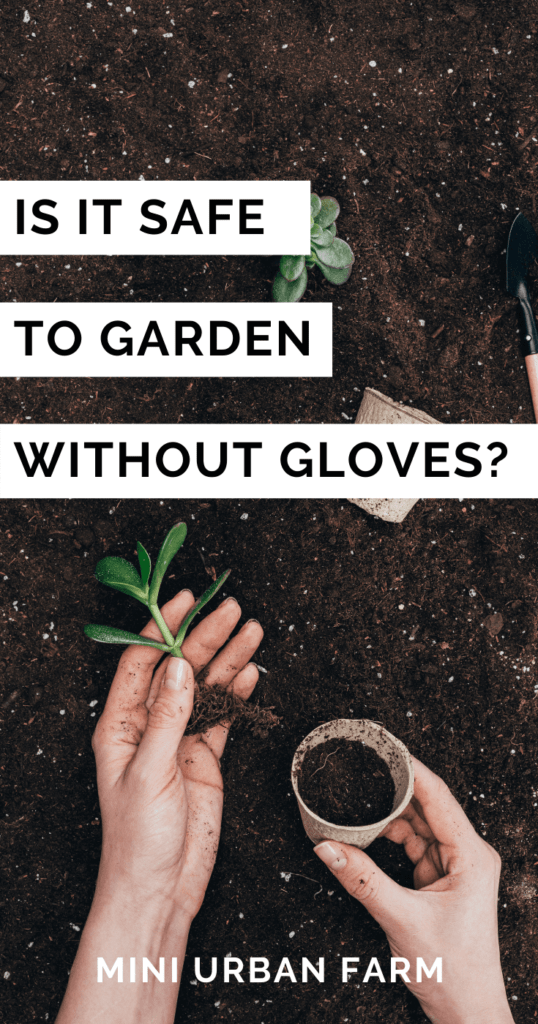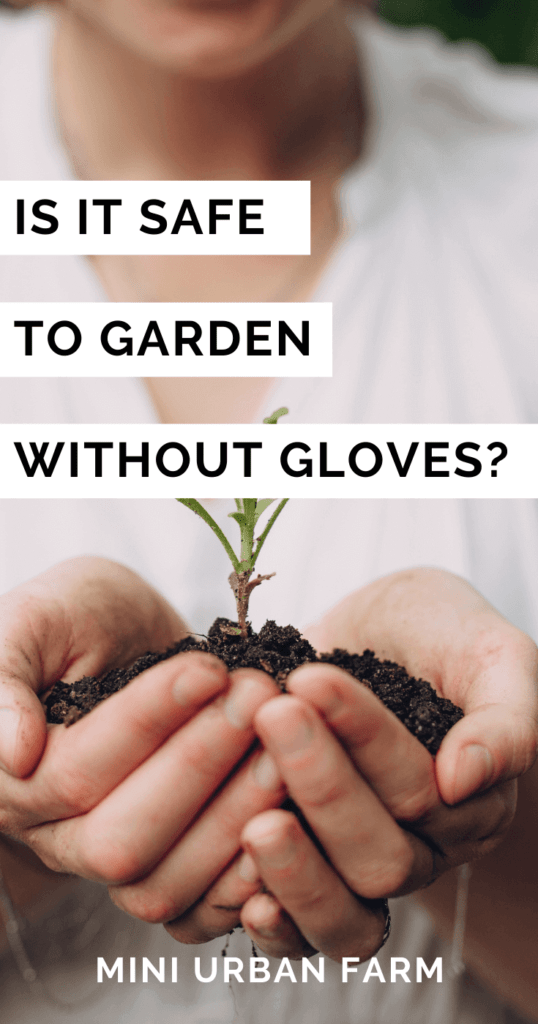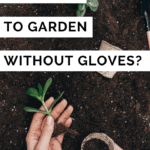The other day I was visiting my friend. She was working in her garden and I offered to help her out. But before she let me help her, she insisted that I put on some gardening gloves. I’ve never actually felt the need to wear gardening gloves, so I started wondering- Is it safe to garden without gloves?
Yes, it is completely safe to garden without gloves. But, you might want to consider wearing gloves if you are about to work with anything with thorns, plants that can cause irritation, or poisonous plants. Here are a few more reasons why you should consider wearing gloves while gardening.

Disclosure: This post may contain affiliate links. If you purchase a product through one of our affiliate links we make a small commission from the sale at no extra cost to our readers.
Legionnaires’ disease
Legionnaires’ disease is a kind of pneumonia which is caused by a bacteria called legionella, which lives in soil.
This bacteria flourishes in moist conditions.
So if you live in an area which gets a lot of rain and the soil is mostly moist you might want to consider wearing gardening gloves.
People can easily breathe in the legionella bacteria through the moisture in the soil or dust while they are working with compost, soil or the potting mix products.
This is especially dangerous for elderly folks – especially those whose immune system is already compromised or vulnerable.
Scary huh!
To prevent breathing in the bacteria wearing a dust mask could also be a good idea.
Avoid getting any soil too close to your face to avoid the risk of transmission!
Open Cuts and Tetanus
Since the 1960s most people get vaccinated against the Clostridium Tetani bacterium in early childhood.
This bacteria is responsible for the Tetanus infection and is usually present in soil or manure – which are rich in different types of organisms.
If you are vaccinated you are somewhat protected from the bacteria.
But if you are not vaccinated and your skin gets punctured, scraped or broken while gardening, then the bacteria can easily pass through your skin and cause the infection.
So, to stay on the safe side, if you are working in your garden and you have cuts on your hands then it’ probably better to wear gloves!
Even if it’s just to keep the wound clean.
Before you decide to take the gloves off make sure your wounds have healed completely and that there is no risk of being infected.
A few symptoms of tetanus are stiffness of limbs, cramps and weakness which lead to partial paralysis.
If you experience any of the symptoms make sure to get in touch with a doctor immediately to avoid the risk of more serious complications.
Creepy Crawlers
Ugh, I detest it when something creepy and crawly comes on my hands.
Even though I have been gardening for over 10 years, I still can’t stand when something crawls on my hands.
And of course, I know that my garden is home to many spiders, bugs and snakes.
I hope I never run into any of them while I’m gardening. But it still gives me chills at the thought if it.
So if you’re like me and don’t love the feeling of hairy spider legs on your hands, it might be worth investing in a pair of gardening gloves!
Plus, a good pair of gloves would protect against venomous spider, snakes or other insect bites.
Here in the US spiders are mostly harmless. However, a few such as the Black Widow and Brown Recluse spiders can be harmful.
So whenever I am putting my hands where I know there will be creepy crawlies, I always wear my gloves!
Poisonous Plants
Many garden plants are poisonous or can cause irritation on your skin.
And even if you’re an avid gardener, you might not be able to correctly identify every plant every time.
I have been gardening for a while and still can’t identify every single plant growing outside my door.
So if you do come across a plant which you didn’t put in your garden, it’s a good idea to put on your gloves – just in case.
You never know if the leaves, flower or the sap of the plant is toxic.
The last thing you want is a rash or allergic reaction that could have been avoided!
Psst…want to fast track your garden? Get access to my FREE gardening resource library and start maximizing your garden today!
Cat Waste
My friend who loves to garden has a cat named Pebbles.
I joke around with her that she named the cat that because he leaves little pebbles all over her garden!
And even though Pebbles is potty trained, cats think the world is their litter box. They think that they can poop, dig and cover wherever they want – even all over the rosemary plants!
And the last thing I want to come in contact with while gardening is cat droppings!
Infected cat feces contain bacteria which can cause diseases such as toxoplasmosis. This can lead to seizures, fevers, muscle pain, and even brain inflammation.
No, thank you!
So if you are a cat owner or have a lot of stray cats visit your garden then I would advise you to wear gloves before you begin digging into the soil.
Prickly Plants and Sharp Edges
Gardening often requires dealing with sharp tools to dig holes, transplant seedlings, and cut out difficult root systems.
Plus, gardeners often come in contact with thorny plants.
If you’ve ever unwittingly run your hand into a rose bush, then you know this isn’t fun!
Using gloves protects against all these prickly plants and the edge of a shovel.
Pesticides & Pest Control
If you use any pesticides in your garden, make sure to grab your gloves before spraying.
The chemicals in these plants can cause irritation to your skin, or even cause a severe allergic reaction.
Plus you wouldn’t want to have chemicals on your skin and transfer that to other objects around the house.
Even natural and organic pest control methods are not meant to come in contact with skin. So before I spray my neem oil mix or my diatomaceous earth, I grab my gloves – just in case!
I, for one, don’t want neem oil all over my hands for the rest of the day!
What Type of Gloves Do I Need?
If you’ve ever walked into the gardening section at Home Depot, you know that gardening gloves come in all shapes and sizes.
Not all gardening gloves are created equal, so choosing the right ones for the right situation is key!
If I’m trying to protect my manicure, I opt for cloth gloves that keep most of the dirt off my nails. But if I’m ripping out roots and thorny plants, something heavier is a good idea.
These ones are my overall favorite gloves – they’re flexible, but still coated with latex for heavy duty work!
Check out the options below to find the best ones for each situation
- Leather Gloves – usually waterproof, quite expensive but provide more protection against thorns and from getting cut or scraped. The gloves used to pick roses are usually made of leather.
- Cloth Gloves – Usually the cheapest kind of gardening gloves you can find. They are made from cotton or knit jersey and can be easily washed in the washing machine. They don’t offer a lot of protection to the hands, but they do keep the hands clean. Plus they are much more breathable!
- Rubber Coated Gloves – Rubber coated gloves protect against chemicals such as pesticides, fungicides or herbicides. They also provide flexibility. However, they may not offer a lot of protection against thorny plants or sharp materials. Sharp objects can easily penetrate these gloves. And the sticky nature of the rubber material can make hands very sweaty.
- Neoprene or Nitrile Gloves – these are made out of synthetic rubber which is useful for protecting the hands against chemicals and scrapes. They provide flexibility and the material is more breathable than that of the rubber coated gloves. Still, thorns can still puncture through the gloves and cause injury.
Is it okay pull weeds without wearing gloves?
Unidentified weeds in your garden should always be pulled while wearing gloves to prevent irritation or allergic reactions. If you know for sure what the weed is (and that it’s not poisonous) then you can go ahead and skip the gloves. But if you have no clue, it’s better to be safe than sorry!
Do you need to wear a mask while gardening?
If you are handling vast amounts of compost or chemicals it’s advisable to wear a mask. The same is true if you have a weakened immune system. Compost often contains spores of bacteria that are potentially harmful when ingested in large amounts. But a mask is not usually required for daily gardening tasks. A mask is a good idea, though, when you are spraying any kind of chemicals in your garden. Things like herbicide, pesticide or fungicides. Just so that you don’t inhale any of the harmful chemicals!
Is gardening healthy for the brain?
A study published in the Proceedings of the National Academy of Sciences (PNAS) showed that the mycobacterium found in soil has the potential to reduce anxiety and stress. It increases the serotonin production in the brain which is the happy chemical and relaxes the body! No wonder kids love playing in the dirt! So get your hands dirty and be happy!
Overall, it is safe to garden without gloves! I have been gardening without gloves for many years. But I always know when to put on a pair of garden gloves to reduce irritation or injury. Feeling the dirt on your hands when planting out seeds, or harvesting tomatoes on a sunny day are all part of the joys of gardening! So as long as you know when to pick up a pair of your favorite gloves, there’s no need to stress about gardening with your bare hands!
I hope this was super helpful! And for more gardening resources, get access to our free gardening resource library! It will help you fast track your garden and it only takes 5 seconds!
Pin Is It Safe to Garden Without Gloves!



